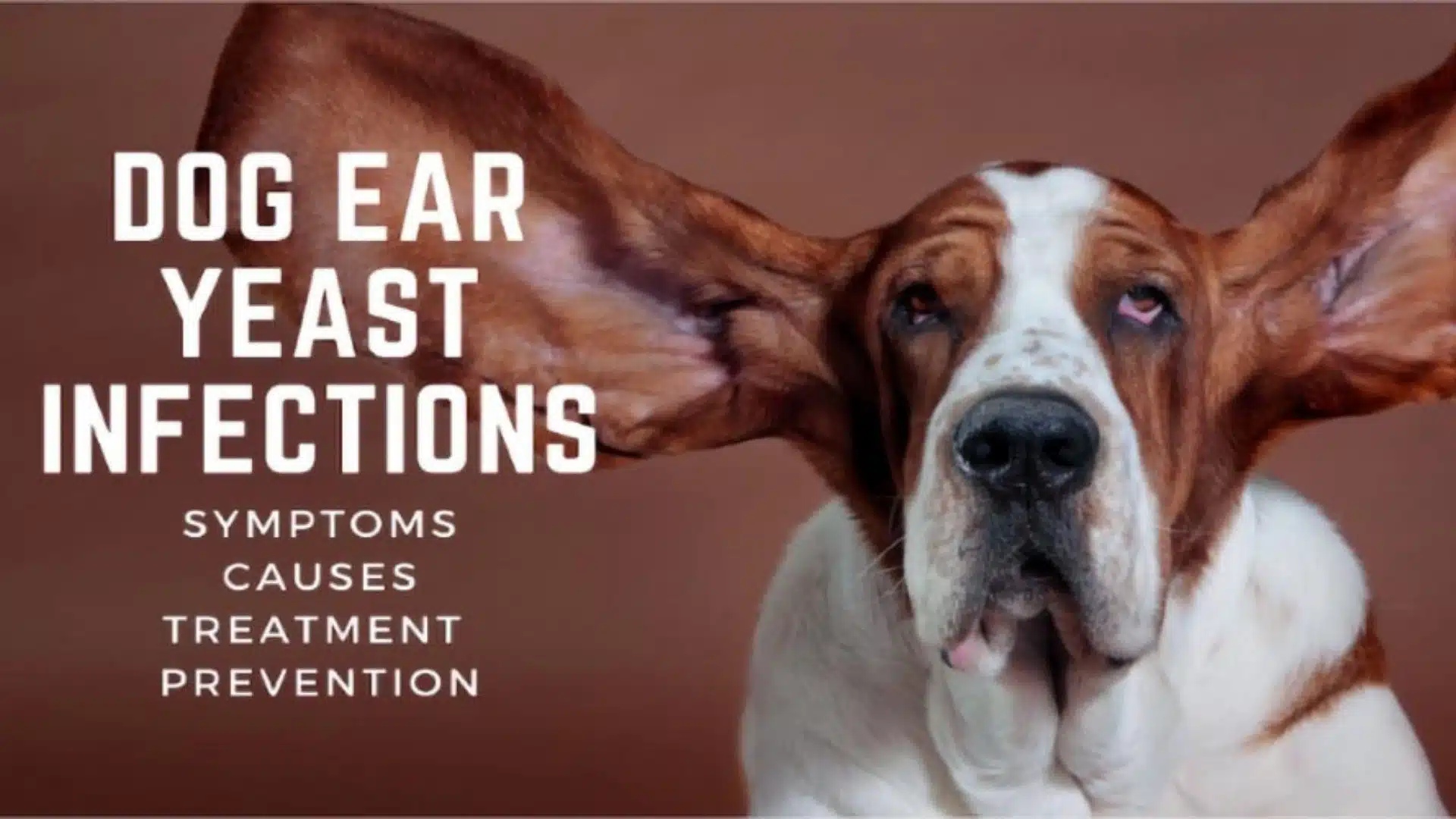


You may be wondering, “does a yeast infection in a dog’s ear smell bad?”
Yes! This is one of the most common signs of an ear yeast infection in a dog. Typically, the ear will smell bad, and if you look deeply into the ear, you will notice black or dark brown discharge. Yeast infections are also usually associated with itching, so your dog might shake his head or dig at the ears with their back legs. If you are noticing a yellow discharge, this might be a sign of a bacterial ear infection. If you want to learn more about other causes of ear infections, be sure to check out this article on Dog Ear Infections.
Yeast infections in dogs can be caused by a variety of different underlying problems.
One of the most common causes of recurrent yeast infections is underlying allergies. Your dog may be allergic to an ingredient in the food. The most common food allergies are associated with proteins in the food including chicken, beef, or eggs. In addition, environmental allergies, also known as atopy, can cause recurrent ear infections. Other signs that your dog may have allergies include skin itching and skin infections. If your dog gets yeast ear infections often, then they may have an underlying allergy.
Does your dog swim often or get bathed frequently? Yeast love moisture! If the ears are getting wet often and not drying properly, this can create an ideal environment for yeast growth. Many dogs that swim often may be more predisposed to developing yeast infections.
It has been suggested that dogs with floppy ears may be more predisposed to ear infections. While we aren’t sure if this is related to the confirmation of the ear or the dog breed, in my experience, dog ear yeast infections do occur more commonly in dogs with floppy ears.
Any dog breed can develop a yeast infection, but certain dog breeds may be more predisposed to yeast infections. Based on my experience as a veterinarian I diagnose yeast infections most commonly in the following dog breeds:
Maintaining your dog’s ear health is crucial, and there are excellent products designed for effective ear care. Explore top-rated canine ear drops formulated to address issues such as ear infections, wax buildup, or irritation.
The most common dog ear yeast infection treatment is a veterinary prescribed ear ointment. These dog-specific ear ointments are safe for dogs and usually contain an antifungal medicine to treat the infection and a steroid to reduce the itching and inflammation in the ear. In addition to dog ear infection medications like ear ointments, your veterinarian may wish for you to clean out your dog’s ear. Dechra Malacetic Otic is one of my favorite ear cleaners for dog ear yeast infections. If you have never cleaned out a dog’s ear before, check out this article on how to clean a dog’s ears. After ear cleaning or administering ear medication, don’t forget to give your pup a tasty treat!
If the yeast infections are recurring, your veterinarian will likely wish to determine the underlying cause of the ear infections. Because many yeast infections in dogs are caused by allergies, your vet may want to try a special allergy diet that is made for dogs with food allergies. Your vet may wish to prescribe allergy medications including Apoquel, Cytopoint, steroids, or antihistamines. Another option that may improve itching associated with allergies is to try a fatty acid supplement. While these medications won’t cure ear yeast infections, they may help to reduce some of the symptoms associated with allergies. To learn more about allergy medication use in dogs, check out this complete guide to dog allergy medication.
You may be wondering how to treat a dog ear infection without a vet or if there are potential dog yeast infection home remedies. Unfortunately, there are not any safe and effective at home treatments for yeast ear infections. Although many at home treatments like coconut oil or Monistat for a dog ear yeast infection are described online, these solutions are unsafe and may harm your dog. Please do not put anything into your dog’s ear without consulting first with your veterinarian.
Usually, if your dog has had a few yeast infections, your veterinarian will recommend routine cleaning with a dog ear cleaner. My favorite ear cleaner for dogs with yeast infections is Dechra Malacetic Otic. I recommend using this every 1-2 weeks or after bathing or swimming in dogs that get regular ear infections. Especially if your dog swims a lot, be sure to always flush the ears with a dog ear cleaner after swimming to ensure that yeast infections do not develop. To learn easy steps for cleaning a dog’s ear, visit this article on How To Clean Your Dog’s Ears in 4 Easy Steps.
If your dog has excessive amounts of debris in the ear or is scratching excessively, you should make an appointment with your veterinarian. It is better to treat ear infections sooner rather than later so you can get your dog some relief. Veterinarians can prescribe easy-to-use ear medications that will get your pup feeling better quickly!
If you enjoyed reading this article, head over to our Vet Corner where more articles can be found.

The medical, nutritional, or behavioral advice we provide is intended for informational and educational purposes only. Our editorial content is not a substitute for formal or personalized medical advice from a veterinary professional. Only board-certified veterinary specialists who have examined your pet should diagnose medical conditions, provide personalized treatment, or prescribe appropriate medication. For questions regarding your pet’s health, or if your pet is exhibiting signs of illness, injury, or distress, contact your veterinarian immediately. Never disregard professional medical advice or delay in seeking it because of something you have read on our site.